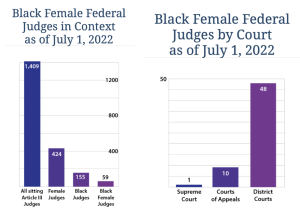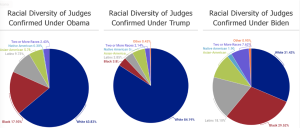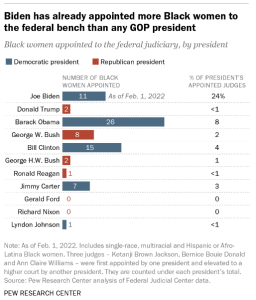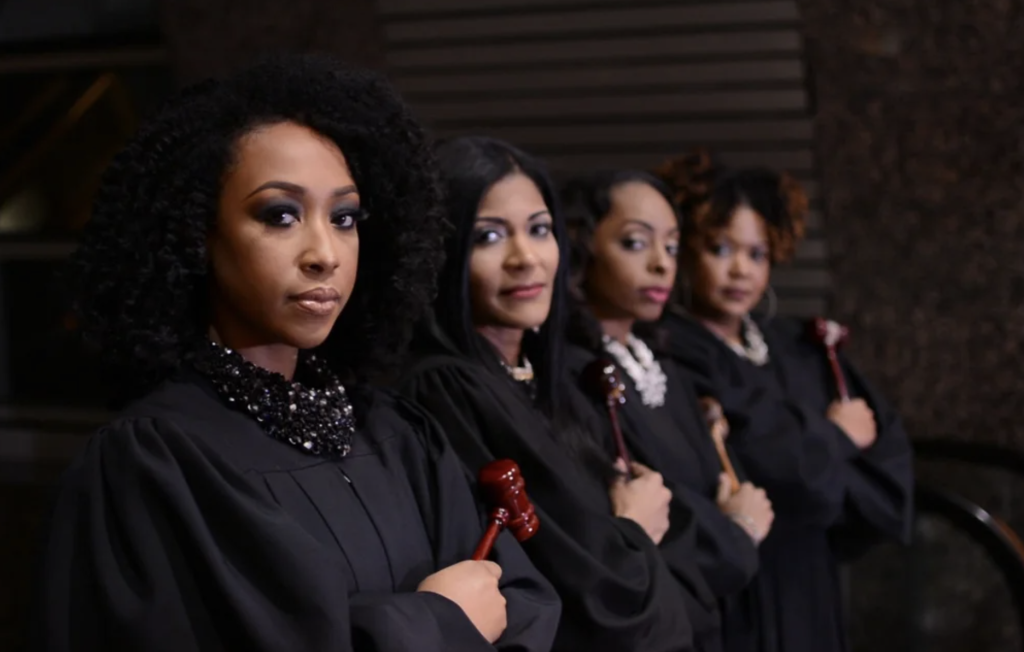By Holli Holliday and Chantel Mullen, Sisters Lead Sisters Vote
“In America, it is still hard to be a woman, and it is still hard to be a person of color. And that’s particularly true in the legal profession” – Judge Ann Claire Williams, first Black woman appointed to the US Court of Appeals for the Seventh Circuit
In 2022, Ketanji Brown Jackson became the 116th and first Black woman Supreme Court Justice, 233 years after the founding of the Supreme Court and 115 Justices appointed to the highest court in the land. Yet even with this historic appointment, Black women remain underrepresented in the Federal Judiciary, which means the fight for representation continues.
The American Bar Association’s Black Women on the Federal Bench profile notes that “ationwide, there were 59 Black female judges among the 1,409 sitting Article III judges in the federal court system on July 1, 2022, according to the Federal Judicial Center, the education and research agency of the federal courts. That included 54 judges who identified themselves as Black or African American, and five who identified as partly Black or African American. Most serve at the federal trial court level – the U.S. district courts. Of the 1,088 sitting judges on federal district courts, there were 48 Black women as of July 1, 2022. That’s just 4.4% of all the district court judges. California had six Black female judges in district court, while Illinois and New York each had four. Twenty-seven states had none. On the appeals court level, 10 Black female judges were among the 292 sitting judges on July 1, 2022. That’s 3.4% of all appeals court judges.”

Credit: https://www.abalegalprofile.com/judges.php#anchor1
The numbers may be small but the numbers are growing. The key to continuing to change the face of the Federal Judiciary to understand a simple process. All federal judges are nominated by the President of the United States, screened by the Judiciary Committee of the Senate then confirmed by a simple majority vote in the Senate. When looking at the Black women judicial appointments is clear that more Black women are appointed by Democratic presidents than Republicans. Full stop. Democrats appoint more Black judges than Republicans. PERIOD.

Credit: https://www.acslaw.org/judicial-nominations/diversity-of-the-federal-bench/
Beginning in 1966, Constance Baker Motley, the 1st federal judge, was appointed by Democratic President Lyndon B. Johnson, to the District Court of New York. The data shows that democratic administrations appoint Black women to the federal bench. Up until December 31, 2022, Democratic presidents Johnson – Obama appointed 49 Black women to the federal bench. Republican presidents Nixon – Trump appointed only 13 Black women to the federal bench. In fact, the majority of the Black women on the federal bench were appointed by Democratic presidents. Presidents Obama, Clinton and Carter appointed 26, 15 and 7 Black women to the federal judiciary, respectively. Both Obama and Clinton were Democratic presidents who served 8 years and Carter, also a Democrat, served only one term. The data is clear that Democratic presidents are appointing Black women to the federal bench at 3xs the rate of Republican presidents.

We are still breaking judicial barriers. President Biden’s appointment of Justice Ketanji Brown Jackson to the Supreme Court of the United States being one of those barriers. But that is just a part of the story, President Biden has eclipsed both Obama, Clinton and Carter in the percentage of Black women appointed. “As of Feb. 1, Black women have accounted for around a quarter (24%) of Biden’s appointed judges – far higher than the percentages for any other president, including Obama (8%) and Clinton (4%)”.
As of February 14, 2023, 26 of Biden’s first 100 judicial nominees confirmed have been Black women and 12 of Biden’s first 30 judicial nominees confirmed to the Circuit Court have been Black women. President Biden and the Democratically controlled Senate has been able to confirm through February 16th 105 Article III judges:
- 1 justice to the U.S. Supreme Court (1 Black woman)
- 30 circuit court judges (12 Black women),
- 74 district court judges (12 Black women), and
- No judges to the U.S. Court of International Trade.
And there is still more to come. Biden’s 101 judicial confirmation was a Black woman to the Oregon District Court. And there are at least 7 Black women whose federal nominations are pending and there are 85 judicial seats open as of February 18, 2023.
So if your goal is to have more Black women on the bench, the data is clear which party will get you there. However, this is just a starting point. It is also clear that we must keep our foot on the gas. The reason we have our first Black woman on the US Supreme Court is because we demanded it. If federal judges are a priority, then we must let those we elect to the Senate and as President know that this is a priority. It was at the Presidential debate in February 2020, that then candidate Joe Biden made a promise to nominate a Black woman to the SCOTUS if a seat came open during his term. That promise was fulfilled about 2 years later, when Justice Ketanji Brown Jackson was nominated on February 25, 2022 and sworn in on June 30, 2022.
“Something which we think is impossible now is not impossible in another decade.”— Judge Constance Baker Motley, first African American woman to argue a case before the Supreme Court, and the first to serve as a federal judge.




